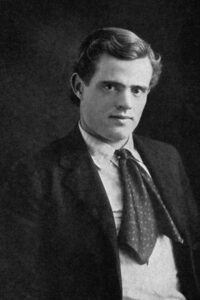
Hearts of Three
EVENTS happened very rapidly with Francis Morgan that late spring morning. If ever a man leaped across time into the raw, red drama and tragedy of the primitive and the medieval melodrama of sentiment and passion of the New World Latin, Francis Morgan was destined to be that man, and Destiny was very immediate upon him.
Yet he was lazily unaware that aught in the world was stirring, and was scarcely astir himself. A late night at the bridge had necessitated a late rising. A late breakfast of fruit and cereal had occurred along the route to the library the austerely elegant room from which his father, toward the last, had directed vast and manifold affairs. “Parker,” he said to the valet who had been his father’s before him, “did you ever notice any signs of fat on E.H.M. in his last days?”
“‘Oh, no, sir,” was the answer, uttered with all the due humility of the trained servant, but accompanied by an involuntarily measuring glance that scanned the young man’s splendid proportions. “Your father, sir, never lost his leanness. His figure was always the same, broad-shouldered, deep in the chest, big-boned, but lean, always lean, sir, in the middle. When he was laid out, sir, and bathed, his body would have shamed most of the young men about town.
He always took good care of himself; it was those exercises in bed, sir. Half an hour every morning. Nothing prevented. He called it religion.”
Read or download Book
Jack London
John Griffith Chaney (January 12, 1876 – November 22, 1916), better known as Jack London, was an American novelist, journalist and activist. A pioneer of commercial fiction and American magazines, he was among the first American authors to become an international celebrity and earn a large fortune from writing. He was also an innovator in the genre later known as science fiction.
London was part of the radical literary group “The Crowd” in San Francisco and a passionate advocate of animal rights, workers’ rights, and socialism. London wrote several works dealing with these topics, such as his dystopian novel The Iron Heel, his non-fiction exposé The People of the Abyss, War of the Classes, and Before Adam.
His most famous works include The Call of the Wild and White Fang, both set in Alaska and the Yukon during the Klondike Gold Rush, as well as the short stories “To Build a Fire”, “An Odyssey of the North”, and “Love of Life”. He also wrote about the South Pacific in stories such as “The Pearls of Parlay”, and “The Heathen”.
Family
Jack London was born on January 12, 1876. His mother, Flora Wellman, was the fifth and youngest child of Pennsylvania Canal builder Marshall Wellman and his first wife, Eleanor Garrett Jones. Marshall Wellman was descended from Thomas Wellman, an early Puritan settler in the Massachusetts Bay Colony. Flora left Ohio and moved to the Pacific coast when her father remarried after her mother died. In San Francisco, Flora worked as a music teacher and spiritualist, claiming to channel the spirit of a Sauk chief, Black Hawk.
Biographer Clarice Stasz and others believe London’s father was astrologer William Chaney. Flora Wellman was living with Chaney in San Francisco when she became pregnant. Whether Wellman and Chaney were legally married is unknown. Stasz notes that in his memoirs, Chaney refers to London’s mother Flora Wellman as having been “his wife”; he also cites an advertisement in which Flora called herself “Florence Wellman Chaney”.
Late in 1876, Flora Wellman married John London, a partially disabled Civil War veteran, and brought her baby John, later known as Jack, to live with the newly married couple. The family moved around the San Francisco Bay Area before settling in Oakland, where London completed public grade school. The Prentiss family moved with the Londons and remained a stable source of care for the young Jack.
Early life
London was born near Third and Brannan Streets in San Francisco. The house burned down in the fire after the 1906 San Francisco earthquake; the California Historical Society placed a plaque at the site in 1953. Although the family was working class, it was not as impoverished as London’s later accounts claimed. London was largely self-educated. In 1885, London found and read Ouida’s long Victorian novel Signa. He credited this as the seed of his literary success. In 1886, he visited the Oakland Public Library and found a sympathetic librarian, Ina Coolbrith, who encouraged his learning. (She later became California’s first poet laureate and an important figure in the San Francisco literary community).
In 1889, London began working 12 to 18 hours a day at Hickmott’s Cannery. Seeking a way out, he borrowed money from his foster mother Virginia Prentiss, bought the sloop Razzle-Dazzle from an oyster pirate named French Frank, and became an oyster pirate himself. In his memoir, John Barleycorn, he claims also to have stolen French Frank’s mistress Mamie. After a few months, his sloop became damaged beyond repair. London was hired on as a member of the California Fish Patrol.
First success
On July 12, 1897, London (age 21) and his sister’s husband Captain Shepard sailed to join the Klondike Gold Rush. This was the setting for some of his first successful stories. London’s time in the harsh Klondike, however, was detrimental to his health. Like so many other men who were malnourished in the goldfields, London developed scurvy. His gums became swollen, leading to the loss of his four front teeth. A constant gnawing pain affected his hip and leg muscles, and his face was stricken with marks that always reminded him of the struggles he faced in the Klondike. Father William Judge, “The Saint of Dawson”, had a facility in Dawson that provided shelter, food, and any available medicine to London and others. His struggles there inspired London’s short story, “To Build a Fire” (1902, revised in 1908), which many critics assess as his best.
His landlords in Dawson were mining engineers, Marshall Latham Bond and Louis Whitford Bond, educated at the Bachelor’s level at the Sheffield Scientific School at Yale and the Master’s level at Stanford, respectively. The brothers’ father, Judge Hiram Bond, was a wealthy mining investor. While the Bond brothers were at Stanford, Hiram at the suggestion of his brother bought the New Park Estate at Santa Clara as well as a local bank. The Bonds, especially Hiram, were active Republicans. Marshall Bond’s diary mentions friendly sparring with London on political issues as a camp pastime.






